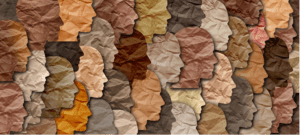This post is part of the Hogg Foundation’s “3 Things to Know” blog series, which explains concepts influencing community mental health and our grantmaking. Check out others in this series: Cultural Humility, Trauma-informed Care, Recovery, Healthy Equity, Social Determinants of (Mental) Health, Resilience and Well-Being.
 Language is constantly evolving. As times change, so do the words people prefer. Here at the Hogg Foundation for Mental Health, we are continuously evaluating the power of language and the impact of the words we use. Language choices can either reinforce negative biases or promote empowerment and strength. Words and phrases that are invented with the best of intentions can cause people to feel alienated or erased, depending on who you ask and when you ask them.
Language is constantly evolving. As times change, so do the words people prefer. Here at the Hogg Foundation for Mental Health, we are continuously evaluating the power of language and the impact of the words we use. Language choices can either reinforce negative biases or promote empowerment and strength. Words and phrases that are invented with the best of intentions can cause people to feel alienated or erased, depending on who you ask and when you ask them.
Over the last several months, the acronym “BIPOC” has gained popularity as the new shorthand for people who in the past might have identified simply as “POC” (i.e. person or people of color). The new term BIPOC – pronounced like “buy pock” – builds on POC by separating out two important groups within the larger “POC” population, namely Black and Indigenous people.
BIPOC has ignited debates about language, race, power, and privilege around the world, including here at the Hogg Foundation. Here are three things to know about the term:
The power of BIPOC lies in its specificity.
Those who champion the BIPOC will explain that, more so than POC, BIPOC emphasizes the specific injustices experienced by Black and Indigenous people that other people of color may not necessarily experience. By emphasizing the specific violence, cultural erasure, and discrimination experienced by Black and Indigenous people, who still bear the impact of slavery and genocide, BIPOC drives home that not all people of color have the same experience when it comes to systemic racism and oppression.
In fact, organizations like Mental Health America are phasing out the term “minority” across their materials and replacing it with BIPOC instead – as seen from their July 2020 decision to rename Minority Mental Health Awareness Month BIPOC Mental Health Awareness Month – which they feel more fairly honors and distinguishes the experiences of Black People, Indigenous People, and People of Color.
Umbrella terms like BIPOC have paradoxical impacts.
While some appreciate BIPOC because of its specificity, just as many resent the phrase for being too vague and homogenous. This is the unfortunate paradox of using “one-size-fits-all” language, especially when it comes to issues of race, power, and privilege. While BIPOC may be embraced as a more accurate and fairer descriptor than an older term like “minority,” its usage as a generic stand-in for all people who are non-white can still be problematic. Some may read BIPOC as a term that is unifying and indicative of solidarity, while others may read it as term that erases nuance and flattens individuality.
To avoid defaulting to BIPOC, be prepared to do some work.
In language and in life, it takes work to ensure that our choices are guided by respect and accuracy. Acronyms and abbreviations are convenient, and can even bring us together, but they are not meant to be used indiscriminately. Instead, we should strive to use the most specific language possible when describing individuals or groups of people with distinguishing characteristics. This is especially true when referencing population studies predicated on distinct demographic descriptors. For example, as Healthline points out, if you are describing the inequality that Black children experience in schools, you will want to refer to “Black students” instead of “BIPOC students,” because the former is a more accurate description of what the data tells us.
There is no substitute for the hard work of combatting bias and becoming anti-racist. It is our responsibility to use language that is respectful and accurate, while staying open and adaptive to the ever-changing ways people opt to describe themselves and their communities.
